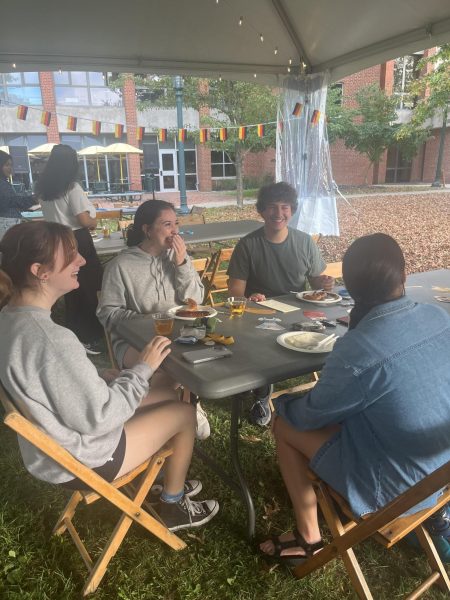Roundtable discusses immigration policy and regional development
The Allegheny College Center of Business and Economics held its 15th annual Executive Roundtable in Ford Chapel on Monday, April 4, 2016. The panel was composed of local area experts and Allegheny alumni. The discussion addressed and was entitled “Immigration Policy and Regional Development in Western Pennsylvania”.
Tomas Nonnemacher, chair of the economics department, opened the event, explaining his personal interest in the topic.
“I’m the son of immigrants to the United States, so this topic is near and dear to my heart,” said Nonnemacher.
Shannan Mattiace, chair of the political science department, began the discussion with a powerpoint about the different types of immigrants. It also included information on immigration demographics in the Western Pennsylvania area comparative to that of other cities and states in the nation.
According to Mattiace’s opening presentation, Pennsylvania falls at 6.1 percent of foreign-born population, lower than the national average of 12.9 percent. Erie has a 6.6 percent higher than the state average due to its high refugee population.
The first half of the discussion was led by Mattiace who directed questions to specific panelists. After this, the floor was opened up for the audience to ask questions.
The panelists offered a wide range of expertise on the topic of regional development through immigration policy. The panel featured Allegheny alumnus Hayes Stover, ’62, immigration, labor and employment attorney at K&L Gates, as well as various community professionals.
Mattiace directed the first question to Greg Kedzierski, plant materials specialist at Ernst Conservation Seeds. She asked about the federal programs of temporary work visas, such as H-2A and why Ernst Conservation Seeds uses these programs to hire agricultural workers. According to Kedzierski there was a labor shortage in the agricultural industry about a decade ago, where people did not want to work in low-skill jobs.
These federal programs allowed temporary work visas for eight men who work 10 months of the year at Ernst Conservation Seeds, and spend two months back in their home country. Kedzierski said these programs benefit both the company and the laborers.
Dylanna Jackson, director of the International Institute of Erie then brought the topic of labor to Erie. Working with the refugee resettlement, Jackson discussed the economic impact of refugees, due to refugees being the largest growing demographic in Erie. The consensus of the panel was that jobs available in the area correlate directly to the number of immigrants that arrive. That is, if there are many jobs available in an area, the more likely it is that area will see more immigrants.
“Erie needs these young refugees,” Jackson said.
Stover contributed to the discussion around work visas, mentioning that K&L Gates have trouble from time to time with the federal government.
“U.S. business immigration policy is a hodgepodge,” Stover said. “I think it is becoming more difficult, and there is a great deal of discretion involved with the immigration policies.”
Betty Cruz, deputy chief of the special initiatives office of Pittsburgh Mayor William Peduto, brought up another major talking point for the panel while discussing the culture of immigrants and integration into these areas.
Pittsburgh is currently creating programs to help integrate the culture of immigrants into the area in order to attract more, according to Cruz. Pittsburgh has had a long history of failing at integrating their African-American community, which lessens the attraction of Pittsburgh to other immigrants.
As the discussion opened up to the audience, Donald Trump and the distinction between authorized and unauthorized immigrants was brought up and led to a mini-debate.
Stover questioned whether it is possible to make a distinction anymore with over 11 million unauthorized immigrants in the country and mass deportation not being a viable option.
Other audience questions included enquiries about cities and states creating legislation that oppose the federal government’s policies. According to Stover, federal policies take precedent over any state or local policies.
Ron Cole, provost and dean of the college, spoke to the importance of discussions such as these for the Allegheny community.
“These are exactly the type of innovative and experiential learning opportunities that are such an important part of an Allegheny education,” said Cole.
Devin Malone, ’16, economics and Spanish double major, echoed Cole’s sentiments.
“It’s the one-on-one experiences like these and the events such as the Executive Roundtable that truly set Allegheny apart from other colleges and universities,” said Malone.








